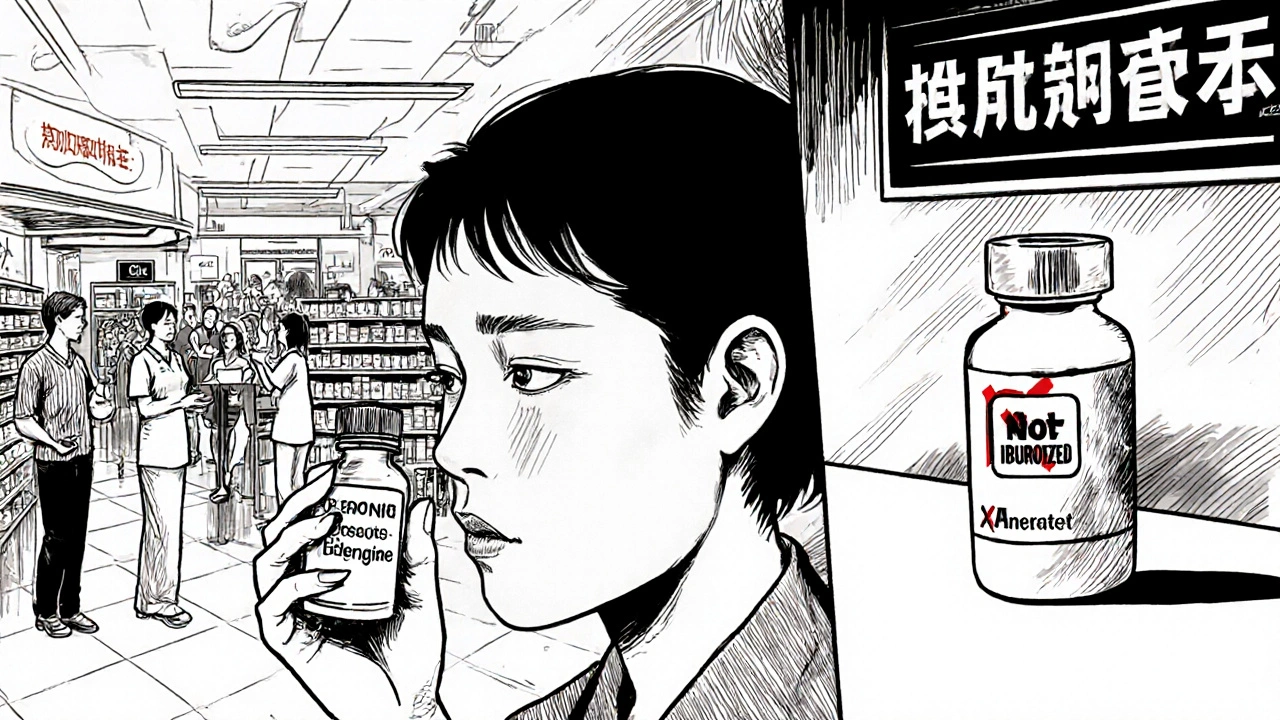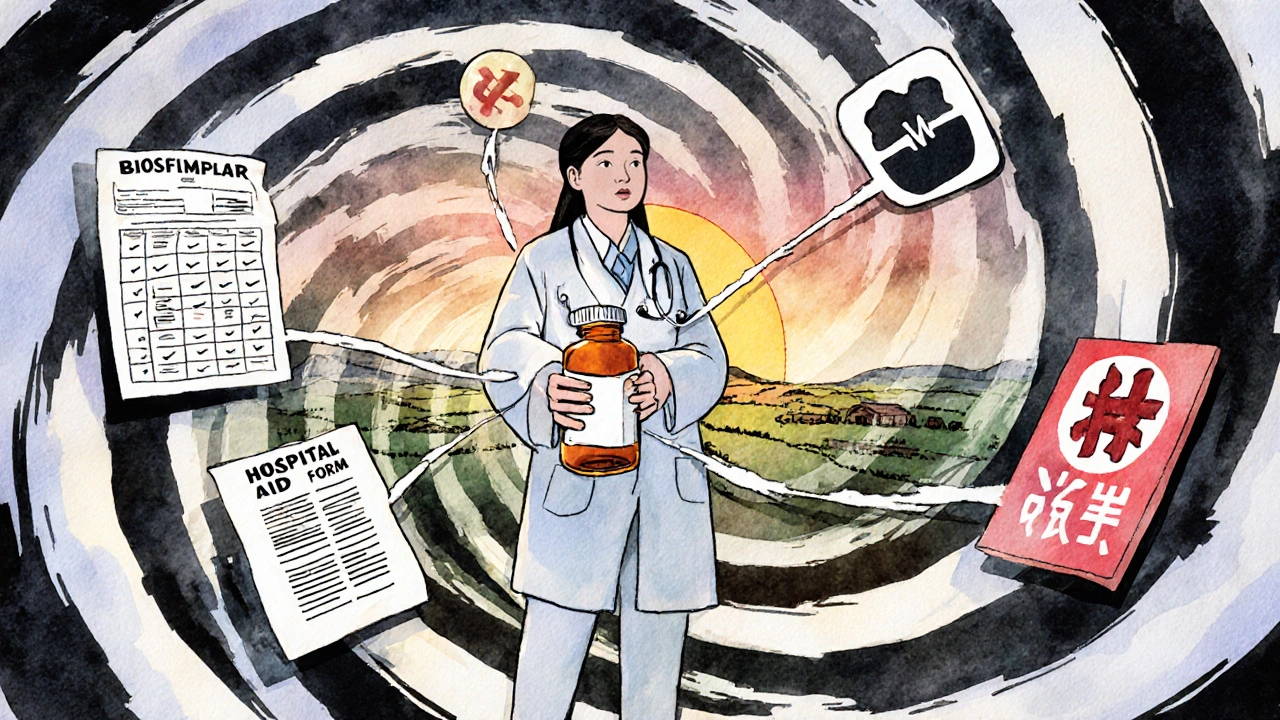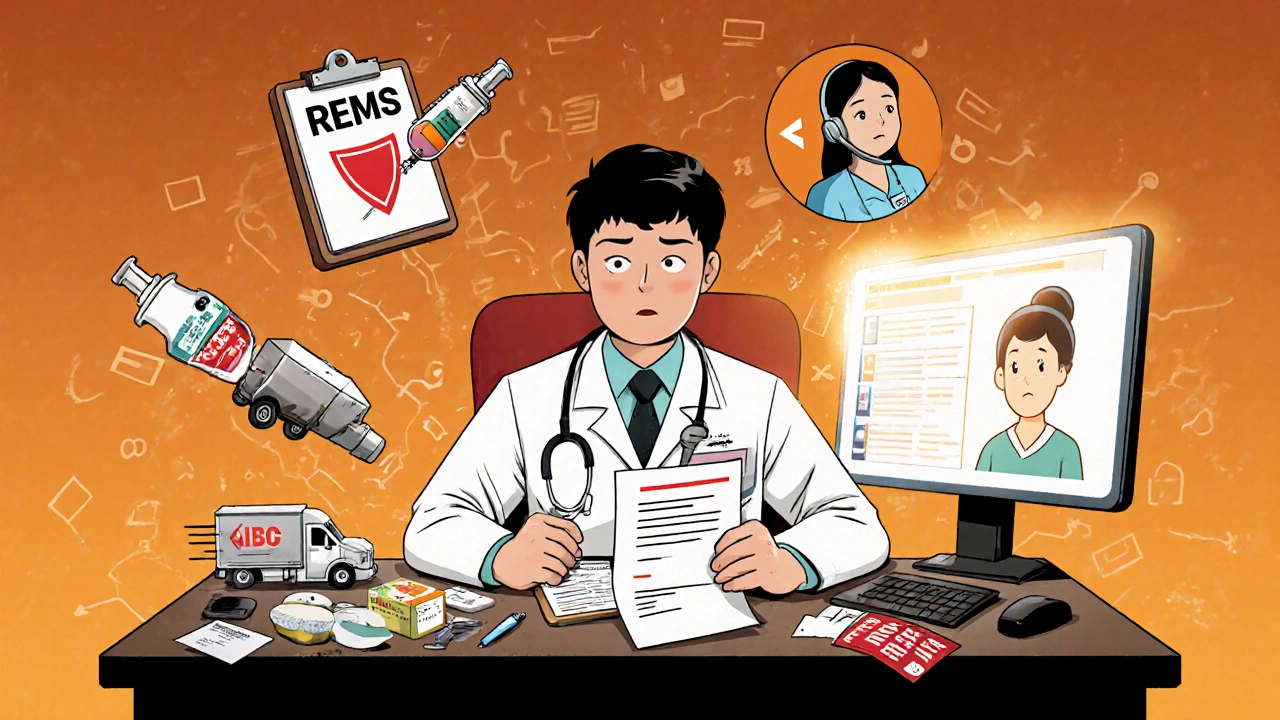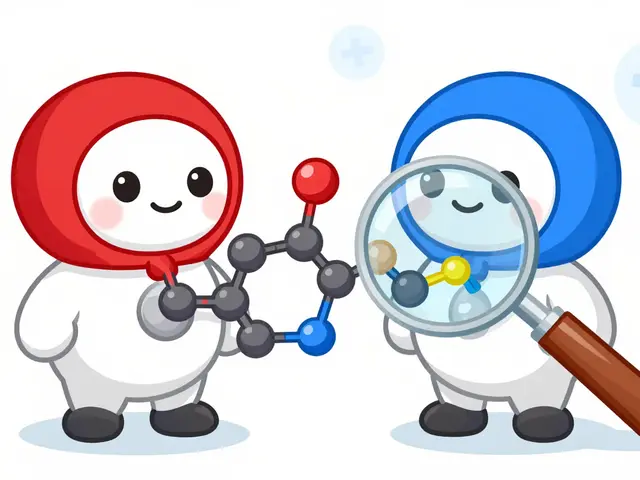When a patient gets a generic version of a high-cost specialty drug, many assume it’s just like picking up a regular pill at the corner pharmacy. But that’s not how it works. Even when a drug is no longer brand-name, if it’s classified as a specialty medication, it still has to go through a specialty pharmacy. And that means the provider’s role doesn’t end with writing the prescription. They’re the bridge between complex drug logistics and patient outcomes.
Why Generic Specialty Drugs Still Need Specialty Pharmacies
Not all generics are created equal. A generic ibuprofen? Easy. A generic version of a biologic drug used to treat rheumatoid arthritis or Crohn’s disease? That’s different. True chemical generics don’t exist for most biologics because they’re made from living cells, not synthesized chemicals. Instead, we have biosimilars - highly similar versions that require the same handling, storage, and monitoring as the original. Even when a small-molecule specialty drug (like methotrexate or cyclosporine) becomes generic, manufacturers often lock distribution to specialty pharmacies through exclusive contracts. This isn’t about profit - it’s about control. These drugs come with strict safety rules called REMS (Risk Evaluation and Mitigation Strategies). They can cause serious side effects. They need special storage. They require patient education. Retail pharmacies don’t have the infrastructure or training to handle that. So even if the price drops 80%, the delivery system stays the same. The provider knows this. They’re the ones who choose where the prescription goes. And if they send it to a retail pharmacy, it might get rejected. The system won’t allow it.The Provider’s Workflow: More Than Just Writing a Script
Providers don’t just write a prescription and move on. For specialty drugs - brand or generic - they’re part of a multi-step process:- Confirming the diagnosis matches the drug’s approved use
- Checking insurance coverage and prior authorization requirements
- Selecting the right specialty pharmacy based on patient needs
- Coordinating with the pharmacy’s clinical team to ensure patient education
- Monitoring lab results and side effects over time
Why Service Matters More Than Price
John Prince of the Drug Channels Institute put it simply: “The distinction between brand and generic becomes almost irrelevant in specialty pharmacy because the service model - not the product cost - determines the distribution channel.” Specialty pharmacies don’t just ship pills. They send out care coordinators who call patients weekly. They send nurses to teach how to use auto-injectors. They track lab values, schedule infusions, and connect patients with financial aid programs. A 2024 survey by MyHealthTeams found that 68% of patients preferred staying with the same specialty pharmacy even after switching to a generic version - not because of price, but because they trusted the same nurse who knew their history. For providers, this means choosing a pharmacy isn’t just about cost or convenience. It’s about continuity of care. If a patient transitions from a brand to a generic drug, but the pharmacy changes, they lose that relationship. They have to re-explain their symptoms, relearn injection techniques, and wait weeks to get back on track. That’s not just inconvenient - it’s dangerous.
Technology Is Changing How Providers Work
In the past, providers spent hours on the phone with pharmacies trying to get prior authorizations approved. Now, many use Real-Time Prescription Benefit (RTPB) tools that show formulary status, copay amounts, and coverage rules before the script is even sent. Surescripts reported that RTPB cut prior auth processing time by 3.2 days across 4.7 million specialty prescriptions in 2023. Providers who integrate these tools into their EHR systems save hours per week. They can send prescriptions directly to the pharmacy with all necessary clinical notes attached. This reduces delays and errors. But not all practices use them. Smaller clinics still rely on fax machines and phone calls - which slows everything down. The key is choosing technology that connects directly with specialty pharmacies. A provider’s workflow should look like this: select drug → check coverage → send to pharmacy → get confirmation → notify patient. Anything less is a bottleneck.The Rise of Biosimilars and What It Means for Providers
In 2024, new CMS rules required Medicare Part D plans to cover all FDA-approved biosimilars. That’s a big deal. Biosimilars are now the fastest-growing segment in specialty pharmacy. By 2026, volume is expected to jump 40%. Providers need to understand that biosimilars aren’t “cheaper versions” - they’re clinically equivalent alternatives. But they still require the same level of oversight. A biosimilar for multiple sclerosis still needs monthly blood tests. It still needs injection training. It still requires monitoring for infusion reactions. The challenge? Many providers still think biosimilars are “just generics.” That’s a dangerous misconception. They’re not. They’re complex biological products. The provider’s role is to educate - not just the patient, but the entire care team. That includes pharmacists, nurses, and even insurance case managers.
What Happens When Health Systems Take Over
A major shift is happening. In 2024, 63% of surveyed health systems said they plan to build or expand their own in-house specialty pharmacies. Walgreens bought Shields Health Solutions. CVS and OptumRx are integrating more tightly with hospital networks. This means providers might soon be pressured to use their hospital’s specialty pharmacy - even if it’s not the best fit for the patient. The goal? To keep revenue inside the system. But that doesn’t always serve the patient. For example, a patient in rural Ohio might have better access to a national specialty pharmacy with 24/7 nurse support than their local hospital’s new pharmacy, which only operates 9-to-5. If the provider is forced to use the hospital’s pharmacy, the patient might face delays, lack of expertise, or no follow-up. Providers must advocate for their patients - even when the system pushes back. Choosing the right pharmacy isn’t about loyalty to a network. It’s about matching the patient’s needs with the pharmacy’s capabilities.What Providers Should Do Today
If you’re a provider handling specialty drugs - whether brand or generic - here’s what you need to do right now:- Know which drugs in your practice require specialty pharmacy distribution - even if they’re generic.
- Build relationships with 2-3 specialty pharmacies that specialize in your patient population.
- Use Real-Time Prescription Benefit tools to avoid prior auth surprises.
- Train your staff to explain to patients why specialty pharmacies are necessary - even for generics.
- Track patient outcomes: Are they adhering? Are they having side effects? Are they getting support?
Specialty pharmacy isn’t about where the drug comes from. It’s about who’s watching over the patient while they take it. And that’s still your job.
Can a retail pharmacy dispense a generic specialty drug?
No - not if the manufacturer has placed the drug under a restricted distribution program. Even generic versions of specialty drugs are often locked to specialty pharmacies by contract. Retail pharmacies can’t legally dispense them, regardless of cost or form. This is true for both brand-name drugs and their generic or biosimilar equivalents.
Why is my copay higher for a generic specialty drug than for a regular generic?
Because specialty pharmacies charge for more than just the drug. They include clinical support, nurse follow-ups, delivery, and REMS compliance. A $15 copay for a regular generic at Walgreens covers the pill only. A $75 copay for a generic specialty drug covers the pill plus ongoing patient management - which can cost the pharmacy $250-$500 per prescription to deliver.
Do biosimilars need the same care as brand-name biologics?
Yes. Biosimilars are complex biological products that require the same storage, handling, monitoring, and patient education as their reference biologics. They’re not interchangeable like chemical generics. Even though they’re cheaper, they still need specialty pharmacy services to ensure safety and effectiveness.
Why do specialty pharmacies take longer to fill prescriptions?
Because they handle more steps: prior authorization, insurance appeals, financial aid applications, patient education, and specialized packaging. A typical retail prescription takes 1.2 days. A specialty prescription averages 7.2 days. Oncology and hepatitis C drugs can take over 9 days because of complex approvals and monitoring requirements.
Should I switch my patient to a different specialty pharmacy if the generic is cheaper?
Only if the new pharmacy offers better clinical support. Don’t switch just to save money. Patients who stay with the same specialty pharmacy through a brand-to-generic transition report higher adherence and fewer complications. Losing a familiar care team can disrupt treatment - even if the drug is cheaper.







kim pu
November 17, 2025 AT 19:28so like... generic specialty drugs are just brand names in disguise? lol. they charge you $75 for a pill that costs 2 bucks to make and call it 'clinical support'? nah fam. that's just rent-seeking with a nurse in a hoodie. i swear, if i could get my methotrexate from the back of a gas station, i would. they're not 'protecting' me-they're protecting their margins. REMS? more like RENT-MAINTENANCE SYSTEM.
malik recoba
November 19, 2025 AT 16:20i just want to say i really appreciate this post. my mom’s on a biosimilar and the pharmacy team actually called her every week to check in. she cried when they said they’d help her with the copay. it’s not just a pill-it’s someone remembering her name. thank you for explaining this.
Sarbjit Singh
November 21, 2025 AT 14:52bro this is so true 🙏. in india we don’t have this system but i read about it and it’s like... the drug is just the beginning. the real medicine is the care. keep doing good work, providers! 💪❤️
Angela J
November 23, 2025 AT 14:35wait… so you’re telling me the government and Big Pharma are using 'REMS' as a cover to keep generics locked down so they can keep charging $75 copays? and the 'nurses' are just corporate shills? i knew it. this is how they control us. they want us dependent. they don’t care if you live or die-just as long as you keep paying for the 'service'. 🕵️♀️💊
Sameer Tawde
November 25, 2025 AT 00:45Simple truth: it’s not about the pill. It’s about the person. If the pharmacy knows your history, your fears, your schedule-you’re more likely to stick with it. That’s worth more than any discount.
Ancel Fortuin
November 25, 2025 AT 15:48Oh wow. So the system is designed to make you pay more for the same drug, under the guise of 'safety'? And you’re just nodding along like this is normal? Let me guess-the same people who invented REMS also invented 'pharmacy networks' so they could charge you for breathing. This isn't healthcare. It's a pyramid scheme with IV bags.
Hannah Blower
November 26, 2025 AT 08:43Let’s be honest-this entire post is a PR pamphlet for specialty pharmacies dressed up as medical insight. You call it 'continuity of care' but it’s just vertical integration with a side of guilt-tripping. Patients aren’t confused-they’re angry. And you? You’re just the guy who wrote the script for the corporate machine. The real question is: who profits when a patient can’t refill at CVS? Hint: it’s not the patient.
Gregory Gonzalez
November 26, 2025 AT 21:05How quaint. You assume patients want to be 'educated' by nurses who call weekly. What if they just want to walk into Walgreens, pay $15, and be done with it? The real tragedy isn't the system-it's that we've convinced people that dependency is care. The pharmaceutical-industrial complex has mastered the art of turning compliance into virtue. Bravo.
Ronald Stenger
November 28, 2025 AT 01:13So let me get this straight-because some drug is 'specialty,' we can’t let Americans get it like normal medicine? This is why the U.S. is falling behind. In Germany, they just dispense it. No nurse calls. No 'REMS.' No $75 copay. Just the pill. We’re not protecting patients-we’re protecting our bloated, overpaid healthcare bureaucracy. This isn’t innovation. It’s exploitation with a clipboard.